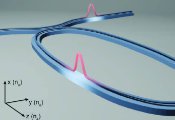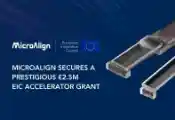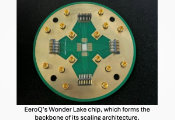Heriot-Watt Secures Three Awards to Drive Innovation in Scotland’s Photonics Sector
December 11, 2024 -- Heriot-Watt University is celebrating success with three funded projects in the first round of awards from the inaugural Photonics and Quantum Accelerator (PQA), a pioneering initiative aimed at accelerating growth in Scotland’s photonics and quantum sectors.
The PQA is a £4.7 million initiative funded by UK Research and Innovation (UKRI) through the Engineering and Physical Sciences Research Council (EPSRC). It brings together leading universities, industry partners, and civic bodies to foster innovation and entrepreneurship in Scotland’s photonics and quantum sectors.
By accelerating the transfer of research into industry and supporting the development of a skilled workforce, the PQA aims to create significant economic and societal impact, with the photonics sector in Scotland projected to grow to over £4 billion by 2030.
Heriot-Watt’s success in securing funding for three projects highlights the university’s central role in driving innovation through collaboration. From quantum communications to optical networks and semiconductor devices, Heriot-Watt researchers are breaking new ground, reinforcing the university’s reputation as a leader in photonics research and technology development.
Revolutionising quantum communications
Dr Natalia Herrera Valencia is spearheading the development of an easy-to-use quantum photonic system to create cost-effective entanglement links over telecom networks. This groundbreaking technology enables ultra-secure encryption and interconnected quantum computers. The system is already being trialled by British Telecom, highlighting its potential to revolutionise data security.
Tackling atmospheric turbulence in communications
Dr Ross Donaldson is leading efforts to develop a 2D waveguide technology to mitigate atmospheric turbulence, a major challenge in optical and quantum communications between satellites and ground stations. This innovation could pave the way for more reliable and efficient communication networks.
Advancing semiconductor device assembly
Professor Brian Gerardot is working on a prototype autonomous semiconductor device assembly system. Leveraging photonic technologies, this machine will facilitate rapid and reproducible creation of advanced materials and devices, unlocking applications in photonics, quantum, and semiconductor industries.
A hub for photonics innovation
These projects are part of a broader effort by the PQA, which unites leading Scottish universities - including Glasgow, Strathclyde, and St Andrews - with industry and civic partners. Together, they are driving innovation and entrepreneurship in the photonics sector, which already contributes over £1 billion to Scotland’s economy and is projected to grow significantly.
Heriot-Watt’s contributions highlight its pivotal role in a region that has been at the forefront of photonics research for over half a century. The PQA’s four-year plan aims to expand Scotland’s photonics economy by fostering entrepreneurship, developing a skilled workforce, and increasing public engagement with photonics technologies.
David Richardson, Chief Entrepreneurial Executive at Heriot-Watt University, added:
"By fostering collaboration between academia, industry, and civic partners, we are co-creating an ecosystem that enables groundbreaking ideas to thrive. This environment supports the development of transformative technologies, encourages entrepreneurship, and ensures our research creates real-world impact, driving progress and opportunity across sectors."
With £3.2 million in funding still available and three innovative projects already underway, Heriot-Watt is excited to build on this momentum and continue driving progress in photonics and quantum technologies. The university’s success reflects the strength of collaboration across the Photonics and Quantum Accelerator partners, whose shared expertise is paving the way for transformative impact in these critical fields.




































